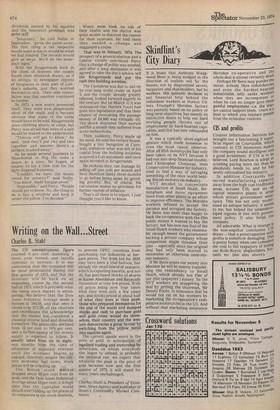Skinflint's City Diary
It is ironic that Anthony Wedgwood Benn is being nudged in the direction of realism not by the bosses, not by disgruntled savers, taxpayers and shareholders, but by workers. His quixotic decision to put financial help behind the redundant workers at Norton Villiers Triumph's Meriden factory was patently based on no policy or long term objectives, but merely an instinctive desire to help out hard working people thrown out of employment by hard-hearted capitalists, and that has now rebounded on him.
It was a typically short-sighted gesture which made nonsense to even the most casual observer. After all BSA motorcycles had only been taken on by NVT because it had run into deep financial trouble, and Christopher Chataway, then Conservative Minister for Industry, tried to find a way of salvaging something of the once world-beating British motorcycle industry. NVT decided to concentrate manufacture at Small Heath, Birmingham and move equipment there from other plants in an effort to improve efficiency. The Meriden workers refused to accept the decision and occupied the factory. Mr Benn was more than happy to back the co-operative with the Om public money it wanted to buy the factory, but has now run foul of the Small Heath workers who reasonably enough resent the government backing a private company whose competition might threaten their jobs — especially since the original deal had only been started to rationalise an otherwise uneconomic industry.
• If Mr Benn pours our money into Meriden he will be merely transferring the redundancy to Small Heath, which already has £5m of our (the taxpayers') money. So the NVT workers are scuppering the deal by getting the chairman, Mr Dennis Poore, to announce that he would not rat on his workers by marketing the co-operative's competitive motorcycles in the US. And without that marketing assistance Meriden co-operative and the whole deal is almost certainly dead.
Perhaps Mr Benn may ponder the moral: nobody likes redundancies and even the hardest-hearted industrialist only sacks workers when they are incompetent or when he can no longer give then"' gainful employment—i.e. the market cannot support them. inere is a limit to which you insulate peuPle from the economic realities.
CIS and profits
Counter Information Services has brought out a fascinating
if sup.er`
ficial report on Courtaulds, which contrary to CIS intentions makes the company sound intelligent and a good investment. If CIS is to be believed, Lord Kearton is adept at avoiding paying more tax than he absolutely needs to, and he has neatly rationalised his industry. "
In addition Courtaulds has moved manufacturing capacitY away from the high cost traditional areas, accuses CIS, and set UP capital intensive plants in areas which attract government ass's' tance. This has not only modernised an antique industry, it seems to me, but helped the underdeve" loped regions in line with govern' ment policy. It also helps the company. All admirable. What is strange is the non-sequitur conclusion CIS h draws — that a preoccupation with profits is somehow damaging. This is pretty funny when one consid, er the cost to the taxpayers of baling out Rolls-Royce, shipbuilders, Fer' ranti etc (see also above).


































 Previous page
Previous page